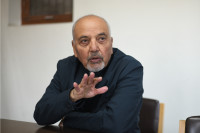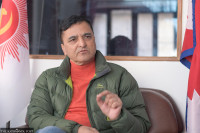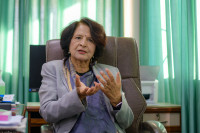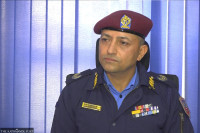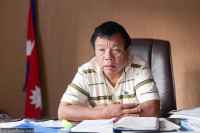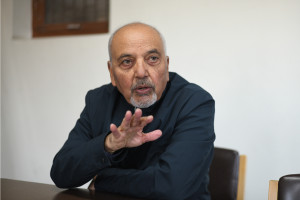Interviews
Dr KC’s call for health sector reforms is legitimate
The appointment of Gagan Thapa, a popular youth leader, as the Health Minister comes at a critical juncture in the country’s medical sector, with the malpractices in the health sector and issues of medical education including affiliation and quality control highlighted by the Mathema report that was made public last year.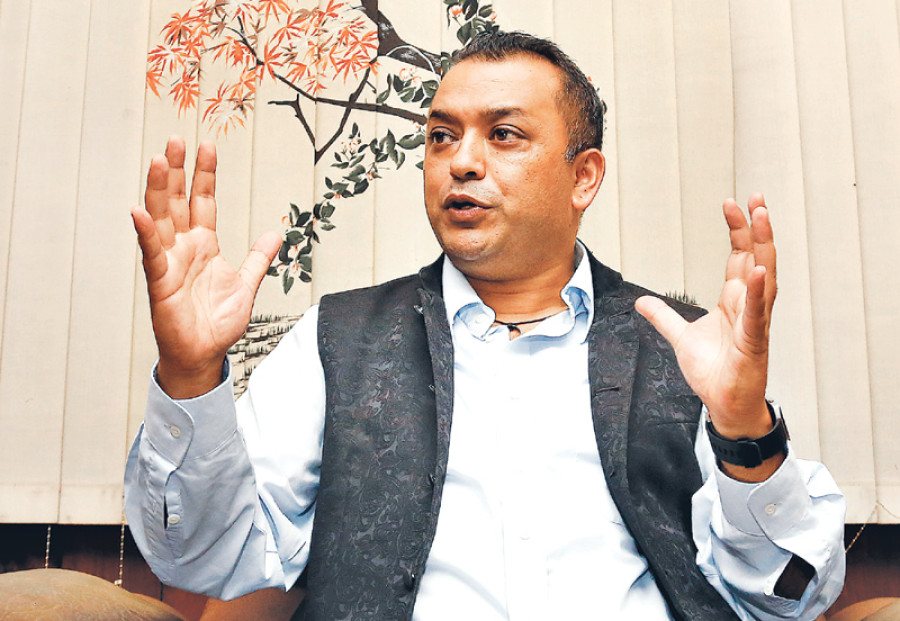
The appointment of Gagan Thapa, a popular youth leader, as the Health Minister comes at a critical juncture in the country’s medical sector, with the malpractices in the health sector and issues of medical education including affiliation and quality control highlighted by the Mathema report that was made public last year. Meanwhile, Dr Govinda KC has staged eight hunger strikes in the last four years against the country’s “medical mafia". Ire over the dismal state of the medical sector has been fuelled further by the state-funded frequent medical sojourns abroad of political leaders. Manish Gautam and Apekshya Shah Rana caught up with Thapa to discuss various anomalies in Nepal’s health care system and his vision and plans to fix the sorry state of the Health Ministry and its subordinate bodies.
Of late, lawmakers’ interest and private investment in medical colleges have drawn much criticism. What is your take on this conflict of interest?
The private sector should enter areas in which the government has not been able to perform. Given the poor health care system of the county, we cannot discourage private investment. But in the health and education sectors, it seems as though the government is completely depending on the private sector and is not doing much to introduce reforms. Of course, if someone prefers a private hospital, then that is their choice. But no one should be forced to go to private hospitals due to the ineffectiveness of government hospitals. That happens often in our country.
So we need to better equip our government hospitals and improve our health system. We are working towards that end.
Legally, politicians are allowed to hold businesses as it is a matter of livelihood for us. So the problem is not with politicians owning businesses; the problem arises when there is a conflict of interest. Everybody should be transparent about the businesses they own and not get involved in matters where a conflict of interest exists. But in Nepal, if a politician has a college, he is considered an expert in the education sector and is assigned responsibilities accordingly. This practice is wrong.
What is your stand on the demands made by Dr Govinda KC?
I completely support the issues Dr KC has raised regarding the medical education sector. I have supported his cause since day one. Even the prime minister is keen on addressing Dr KC’s demands. We have already presented the Health Profession Education Bill to Parliament. The reforms Dr KC has demanded are legitimate and necessary to improve the country’s medical sector.
With regard to the Manmohan Memorial Institute of Health Sciences (MMIHS), the previous government had compromised on the matter. Now there is a separate bill allowing its establishment. But there are talks going on about the MMIHS being handed over to the National Academy of Medical Sciences (NAMS) and opened as a government entity. Even if this plan does not work out, we can withdraw the bill. What I am proposing is that we should change the name of the NAMS to MMIHS so that the name of the late Manmohan Adhikari is associated with a larger entity than a college.
As for the appointment of the dean of the Institute of Medicine, the prime minister has already given instructions to address the matter as soon as possible. Regarding the irregularities in the medical sector, I believe that once the Health Profession Education Commission envisioned in the Health Profession Education Bill comes into place, there will be effective regulation of health education. Dr KC has demanded that there should be at least one medical school in all the seven provinces. We are already working on the plans for those provinces that do not have a medical school. In addition, we are looking into other possible areas of reform in the medical sector.
What are your top three priorities during your ministership?
By the end of nine months, local level elections are supposed to be held, after which new VDCs and municipalities will be in place and there will be changes in the existing districts as well. So the health system will also have to change to align itself it with the new state structures. Inadequate attention has been given to this issue. So far, only the distribution of the existing human resources has been discussed. But the actual health system is yet to be mapped out. By the time local level elections are conducted, the Health Ministry will have a complete plan for the transition of our health system according to federal structures.
Another area we need to focus on is fixing the basics. For instance, at present our health care delivery system, which starts from a health post to a health centre to district and zonal hospitals, is not functional. The health posts and health centres are in dire straits, with many of them operating without doctors. Even the district and zonal hospitals are below par. Perhaps a lack or misuse of resources is to blame for this situation. But whatever the cause, I want to fix this defunct system and I believe we can do so within three to four months. It is challenging, but people will see the results.
I also want to look into the existing health policies. In my tenure, I will make sure that Parliament passes the Social Health Insurance Bill and that the required structures are in place.
Some allege that the Health Ministry, which is arguably one of the most challenging offices to hold, was given to you precisely to make it difficult for you to deliver. Is there any truth to that?
No. In a way, I chose the ministry myself. Among the ministries given to the Nepali Congress, I wanted Urban Development, as I had prior knowledge of the field. But when I discussed this proposition with my party members, I sensed some hesitation on their part, so I chose the Ministry of Health. Some people did advise me to take on a less complicated ministry. But it was my decision to run the Health Ministry, and hopefully I will be able to deliver something substantive.
You recently called on political leaders to seek medical treatment at home rather than go abroad. Some criticised it as a populist measure. What are your views?
I am not implying that people should not go abroad for medical treatments. But I have always been against the practice of eminent personalities going abroad for their treatment with government money. Even normal citizens are opting to go out of the country for better health services or for services unavailable in the country. But many Nepalis cannot afford it at all, while others are doing so by selling their properties. How is it fair that only politicians or eminent personalities get money from the state for treatment abroad? For the state, all its citizens should be equal. If the government is going to provide financial help for those suffering from a disease that cannot be treated in the country, then everybody should be entitled to some kind of support, not only the VIPs.
Even the special services we provide to common citizens are biased. As the health minister, I can get Rs500,000 from Parliament for a sick person. But then the person has to know me to get that money. This process is flawed. Such unfair practices should stop. We are urging government hospitals to raise more social service funds and utilise them efficiently.
I agree that our government hospitals are far from stellar, but we have already begun work towards making them better. We are trying to refurbish VIP suites of government hospitals in the Valley and we will be making new ones where necessary. We will try to get the required equipment in the government hospitals. We will do whatever we can to improve the quality of government-provided health care, but I feel our private hospitals also need to strive to bring their service quality up to international standards so that people willing to pay for those services get them in the country.




 7.12°C Kathmandu
7.12°C Kathmandu
